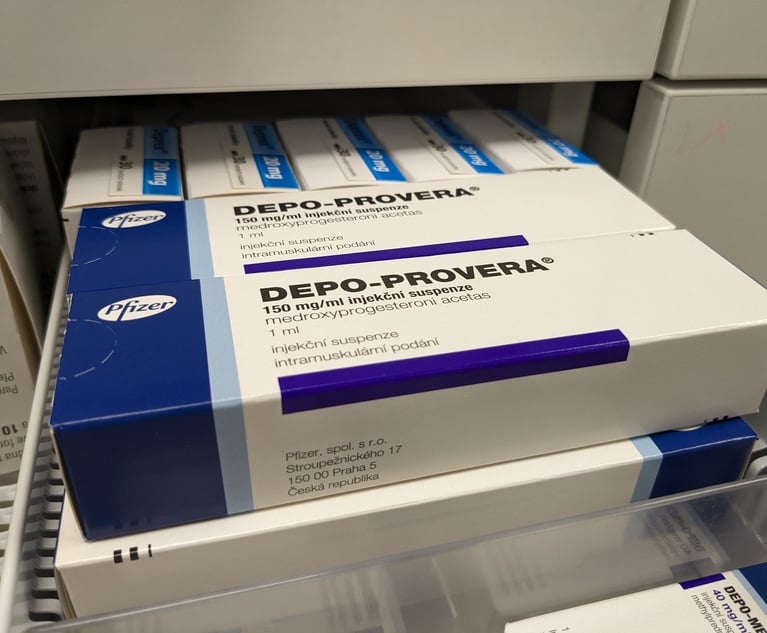Dentons’ New Zealand Expansion Marks Atypical Move
The law firm's plan to set up shop by merging with local firm Kensington Swan will make it just the second global law firm there, after DLA Piper.
August 13, 2019 at 12:49 PM
7 minute read
 Auckland, New Zealand. Photo: Shutterstock
Auckland, New Zealand. Photo: Shutterstock
New Zealand generally doesn’t feature on the expansion plans of international law firms, but Dentons says it expects to pick up more work from Australia when it expands to the small South Pacific nation.
Dentons announced late last month it is planning to set up shop in New Zealand by merging with 113-lawyer local firm Kensington Swan and will become only the second global law firm there, after DLA Piper.
Should the New Zealand firm partners approve the merger, the new entity will become Dentons Kensington Swan and have offices in the commercial centre Auckland and the national capital Wellington.
Doug Stipanicev, Dentons’ Perth-based chairman and chief executive officer of the Australia region, said the firm expects its New Zealand arm will refer local clients with legal requirements outside of their own country to the international firm. Likewise, Dentons globally will refer work to New Zealand.
Most of that work is likely to flow across the Tasman Sea, which separates Australia and New Zealand.
The two nations have had a free trade agreement since 1983, and Australia is New Zealand’s largest export market after China.
“We just find that New Zealand and Australia have cross-investment synergies. Companies in Australia that we act for are looking to expand into New Zealand because they understand the economies and the people,” Stipanicev said. “Equally with New Zealand, with its manufacturing and technical base, the logical first step for global expansion of their clients is across to Australia.”
Forming alliances with a firm in another country is a more attractive option as corporations take more legal work in-house and automation carries out some of the processes traditionally undertaken by lawyers. “The pool of work that you can pick from gradually reduces in your internal market as it gets divested elsewhere,” he said.
Firms also benefit from Dentons’ global management, shared services and global buying power for items such as professional indemnity insurance and software licences.
The Law Society of New Zealand said it does not allow local law firms to share profits with non-New Zealand firms and non-New Zealand lawyers, and Stipanicev said the rule has deterred foreign firms from setting up there. “Obviously the model of Dentons assists that process where each country in the Dentons region continues to own and operate and manage its own business,” he said.
The New Zealand plan was the first in a string of recent expansion announcements from Dentons, which has more than 10,000 lawyers globally. It also announced it would combine with a South Korean firm and with a firm in Honduras.
In October it will combine with existing associate firm Fisher Jeffries in Adelaide, adding 13 new partners with expertise across financial services, corporate, dispute resolution, construction and engineering, employment, manufacturing and real estate.
Joel Barolsky, of Barolsky Advisors, who advises law firms in Australia and New Zealand on business strategy, said those international firms that have come and do come to New Zealand will do so as part of their efforts to support multinational clients everywhere they do business and provide a one-stop shop in every country.
They are not seeking the work on huge deals and huge transactions that other global firms usually look for. “It’s not bet-the-company, but run-the-company kind of work,” Barolsky said. “If you’re pitching to be a legal supplier to a big multinational for the run-the-company work, the more flags you can put on a global map, the better.”
Other firms could follow Dentons and DLA Piper, as a defensive strategy to try to get as many flags as Dentons has on the map, he said.
However, a rush to New Zealand is unlikely.
Barolsky said there isn’t the same flow of corporate M&A and cross-border deal work in New Zealand as there is in Australia.
There has been no particular event to bring international firms to New Zealand in the same way the opportunity to participate in the M&A and project work associated with the mining boom attracted many firms to Australia a decade or so ago.
“It’s a relatively small market. It also hasn’t been a massive growth market,” he said.
Additionally, incumbent firms at the such as Russell McVeagh, Chapman Tripp and Bell Gully are doing high-quality work for corporate clients and have wide international networks.
“It’s not like suddenly there’s this global firm that’s going to land on their shores and show the locals how to do it,” Barolsky said.
With a population of a little under 5 million, New Zealand had a total gross domestic product of US$205 billion in 2018, compared with US$1.4 trillion for Australia and US$20 trillion for the U.S., according to data from the World Bank.
Its main export industries are dairy—which is dominated by family-owned farms and Fonterra, a farmer-owned co-operative that sets farm gate milk prices and produces dairy goods—and tourism, neither of which generally give rise to large deals.
DLA Piper ended up in New Zealand in part because local firm Nicholson Gribbin joined Australian firm Phillips Fox and took on its name. When the Australian firm became part of DLA Piper in 2010, the New Zealand arm maintained the relationship and joined the global firm in 2015.
The merger was many years in the making, dating back to an alliance with Phillips Fox from 1987, said Martin Wiseman, managing partner, New Zealand.
“You can create that alliance on paper overnight, but what you can’t do is create operational integration, the free flow of IT, capital, expertise, trust, and confidence in all directions around the world. That can only be done with years,” he said.
“We have many years under our belt ahead of where Dentons [is]. There’s a whole lot of intangibles that go into creating a truly integrated, effective global law firm—whether it’s integration of system and whether there’s trust and confidence between partners all around the world,” Wiseman said.
DLA Piper New Zealand derives about 30% of its work from being part of the global firm, while the rest comes from the partners’ relationships with local corporates.
The firm’s clients include the nation’s largest supermarket group Foodstuffs North Island, Australian insurer IAG and Fonterra, which the firm has also “exported” as a client to DLA Piper in other countries.
Generally, if a global company has a branch in Australia it will also have one in New Zealand, such as Pfizer and GE, which are both clients of DLA Piper, Wiseman said. The firm also advises multinationals wanting to buy New Zealand startups or tech businesses, particularly agritech.
The work includes advising the corporate venture capital business of Yamaha Motor Co. on investments in two early-stage robotics companies and U.S. tech investor Finistere Ventures on biotech and robotics investments.
Wiseman says global firms have largely stayed away from New Zealand because it’s both a competitive market and not part of the G20, which larger firms focus on. “If you’re setting in New York or London, you’re probably not thinking, ‘What’s my New Zealand strategy?’”
This content has been archived. It is available through our partners, LexisNexis® and Bloomberg Law.
To view this content, please continue to their sites.
Not a Lexis Subscriber?
Subscribe Now
Not a Bloomberg Law Subscriber?
Subscribe Now
NOT FOR REPRINT
© 2024 ALM Global, LLC, All Rights Reserved. Request academic re-use from www.copyright.com. All other uses, submit a request to [email protected]. For more information visit Asset & Logo Licensing.
You Might Like
View All

From 'Confusing Labyrinth' to Speeding 'Roller Coaster': Uncertainty Reigns in Title IX as Litigators Await Second Trump Admin
6 minute read
New Class Action Points to Fears Over Privacy, Abortions and Fertility
Trending Stories
- 1Friday Newspaper
- 2Judge Denies Sean Combs Third Bail Bid, Citing Community Safety
- 3Republican FTC Commissioner: 'The Time for Rulemaking by the Biden-Harris FTC Is Over'
- 4NY Appellate Panel Cites Student's Disciplinary History While Sending Negligence Claim Against School District to Trial
- 5A Meta DIG and Its Nvidia Implications
Who Got The Work
Michael G. Bongiorno, Andrew Scott Dulberg and Elizabeth E. Driscoll from Wilmer Cutler Pickering Hale and Dorr have stepped in to represent Symbotic Inc., an A.I.-enabled technology platform that focuses on increasing supply chain efficiency, and other defendants in a pending shareholder derivative lawsuit. The case, filed Oct. 2 in Massachusetts District Court by the Brown Law Firm on behalf of Stephen Austen, accuses certain officers and directors of misleading investors in regard to Symbotic's potential for margin growth by failing to disclose that the company was not equipped to timely deploy its systems or manage expenses through project delays. The case, assigned to U.S. District Judge Nathaniel M. Gorton, is 1:24-cv-12522, Austen v. Cohen et al.
Who Got The Work
Edmund Polubinski and Marie Killmond of Davis Polk & Wardwell have entered appearances for data platform software development company MongoDB and other defendants in a pending shareholder derivative lawsuit. The action, filed Oct. 7 in New York Southern District Court by the Brown Law Firm, accuses the company's directors and/or officers of falsely expressing confidence in the company’s restructuring of its sales incentive plan and downplaying the severity of decreases in its upfront commitments. The case is 1:24-cv-07594, Roy v. Ittycheria et al.
Who Got The Work
Amy O. Bruchs and Kurt F. Ellison of Michael Best & Friedrich have entered appearances for Epic Systems Corp. in a pending employment discrimination lawsuit. The suit was filed Sept. 7 in Wisconsin Western District Court by Levine Eisberner LLC and Siri & Glimstad on behalf of a project manager who claims that he was wrongfully terminated after applying for a religious exemption to the defendant's COVID-19 vaccine mandate. The case, assigned to U.S. Magistrate Judge Anita Marie Boor, is 3:24-cv-00630, Secker, Nathan v. Epic Systems Corporation.
Who Got The Work
David X. Sullivan, Thomas J. Finn and Gregory A. Hall from McCarter & English have entered appearances for Sunrun Installation Services in a pending civil rights lawsuit. The complaint was filed Sept. 4 in Connecticut District Court by attorney Robert M. Berke on behalf of former employee George Edward Steins, who was arrested and charged with employing an unregistered home improvement salesperson. The complaint alleges that had Sunrun informed the Connecticut Department of Consumer Protection that the plaintiff's employment had ended in 2017 and that he no longer held Sunrun's home improvement contractor license, he would not have been hit with charges, which were dismissed in May 2024. The case, assigned to U.S. District Judge Jeffrey A. Meyer, is 3:24-cv-01423, Steins v. Sunrun, Inc. et al.
Who Got The Work
Greenberg Traurig shareholder Joshua L. Raskin has entered an appearance for boohoo.com UK Ltd. in a pending patent infringement lawsuit. The suit, filed Sept. 3 in Texas Eastern District Court by Rozier Hardt McDonough on behalf of Alto Dynamics, asserts five patents related to an online shopping platform. The case, assigned to U.S. District Judge Rodney Gilstrap, is 2:24-cv-00719, Alto Dynamics, LLC v. boohoo.com UK Limited.
Featured Firms
Law Offices of Gary Martin Hays & Associates, P.C.
(470) 294-1674
Law Offices of Mark E. Salomone
(857) 444-6468
Smith & Hassler
(713) 739-1250









